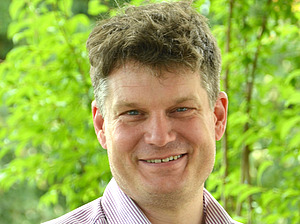"Diversity is essential for our future"
Voices on biodiversity
Jürn Sanders is Chairman of the Management Board of FiBL Switzerland and President of FiBL Europe. He previously headed the Department of Food System Sciences. There, the agricultural economist, political scientist and economist worked intensively on ecosystem services and the environmental impacts of organic farming.
With the "Voices on Biodiversity" programme, over the past few months, we at FiBL have invited experts to have their say, shedding light on the importance of biodiversity from different perspectives. The result is a fascinating kaleidoscope. The contributions provide a trenchant description of why biodiversity is essential for our future and how we can better protect it. For example, biodiversity is essential for pollination, climate regulation, flood protection, soil fertility and the production of food, fuels, fibres and medicines. Without diversity, there are no ecosystem services. Without ecosystem services, there can be no life. Complicated things can sometimes be very simple. However, this does not make them understandable - on the contrary.
This is because biodiversity - the diversity of all life forms, including genetic diversity within species, species diversity and the diversity of ecosystems - is highly complex. It does not simply comprise individual parts that can be added together, but consists of countless interactions, feedback loops and dynamics. This complexity is its special significance: it allows us to deal with change, adapt and regenerate.
Learning to understand complexity
In agriculture, this combination of diversity and complexity is immediately noticeable. A diverse farm - with mixed crops, crop rotations, agroforestry systems, flower strips and a richly structured landscape is not just "nice to look at", it is resilient. It reacts less sensitively to weather extremes or pests. It is also better able to withstand economic pressure. It provides habitats, regenerates the soil, promotes pollinating insects - in short: it lives and lets live.
When we learn to understand complexity, we realise that diversity is not an option, but a prerequisite for long-term stability. Monocultures - both in the field and in thinking - reduce the complexity of a system. They are easier to manage, but also more susceptible to disruption. Complex systems, on the other hand, are demanding but more sustainable in the long term. They rely less on small-scale control and more on clever framework conditions with the aim of utilising synergy potential. After all, every thriving ecosystem shows us that complexity is not chaotic. Complexity stands for cooperation and sustainable added value.
Taking inspiration from nature
At FiBL, we will continue to work intensively on these smart framework conditions over the next few years. We are not only interested in analysing the use and promotion of functional biodiversity or genetic resources. Our aim is also always to be inspired by nature with openness, enthusiasm and amazement and to learn from it. Because nature is - as the American biologist Edward O. Wilson once described it - the largest library in the world, full of solutions that evolution has produced over millions of years. We should be aware that we still only know a fraction of it. Those who understand the value of diversity and protect it effectively are thus making a contribution to our future.




